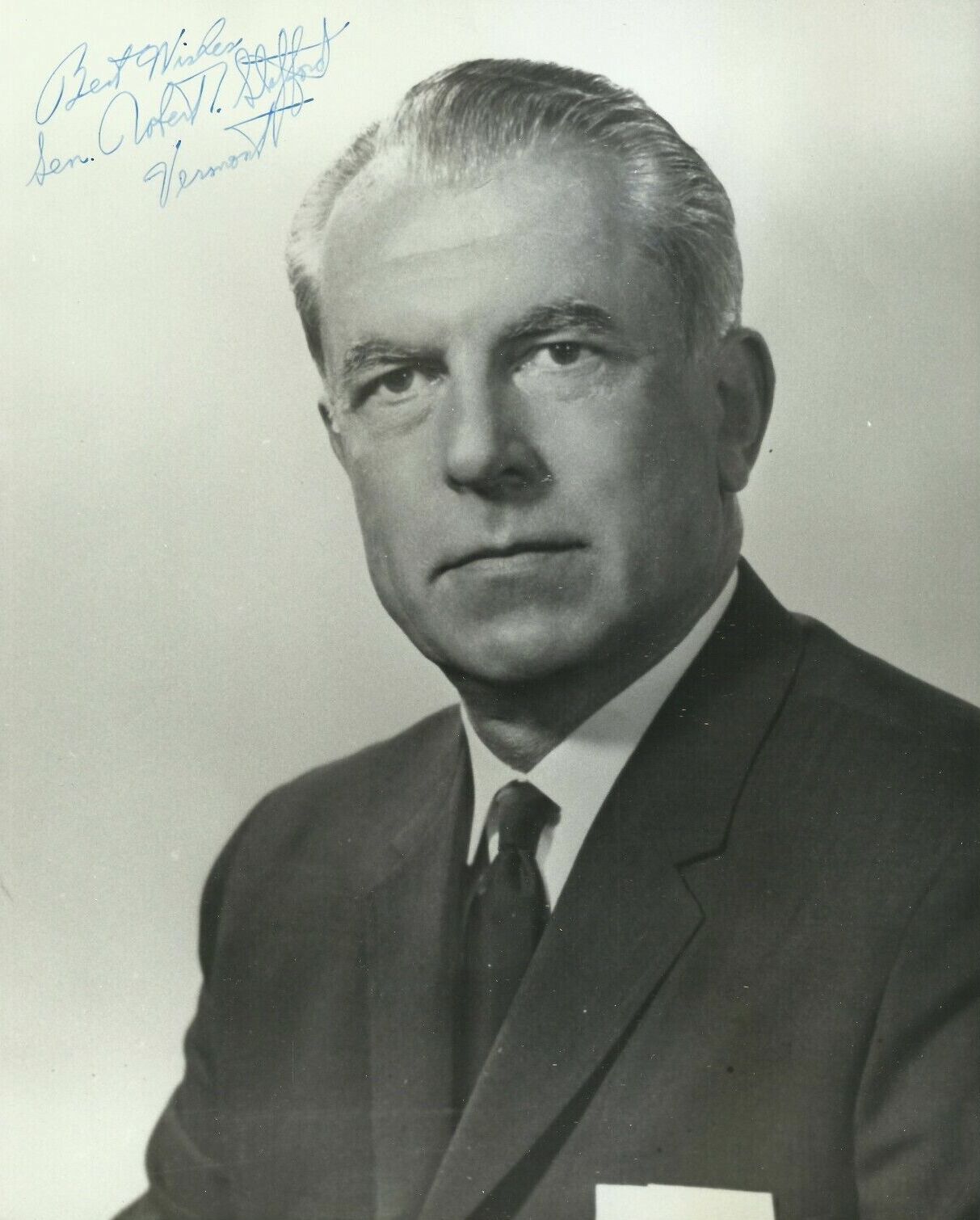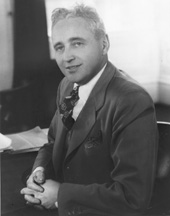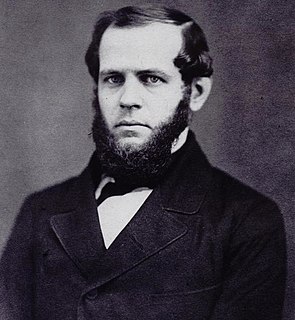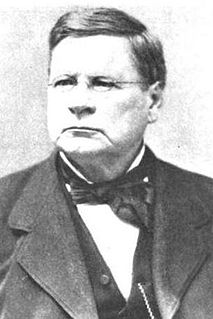
Frederick H. Billings was an American lawyer, financier, and politician. He is best known for his legal work on land claims during the early years of California's statehood and his presidency of the Northern Pacific Railway from 1879 to 1881.

Robert Theodore Stafford was an American politician from Vermont. In his lengthy political career, he served as the 71st governor of Vermont, a United States Representative, and a U.S. Senator. A Republican, Stafford was generally considered a liberal, or "Rockefeller" Republican.

Ernest William Gibson Jr. was an American attorney, politician, and judge. He served briefly as an appointed United States Senator, as the 67th governor of Vermont, and as a federal judge.

Lawrence Brainerd was an American businessman, abolitionist and United States Senator from Vermont. A longtime anti-slavery activist, after leaving the Jacksonians in the 1830s, Brainerd was active in the Whig, Liberty, and Free Soil parties, and was one of the organizers of the Republican Party when it was formed as the main anti-slavery party in the mid-1850s. Brainerd's longtime commitment to the cause of abolition was recognized in 1854, when opponents of slavery in the Vermont General Assembly chose him to fill a five-month vacancy in the United States Senate.

The lieutenant governor of Vermont is elected for a two-year term and chosen separately from the governor. The Vermont Lieutenant Governor's main responsibilities include acting as governor when the governor is out of state or incapacitated, presiding over the Vermont Senate, casting tie-breaking votes in the Senate when required, and acceding to the governorship in case of a vacancy. As a member of the state senate's Committee on Committees, the lieutenant governor plays a role in determining committee assignments for individual senators, as well as selecting committee chairs, vice chairs, and clerks.

Henry Addison Fletcher was an American Civil War veteran, a farmer and a U.S. politician of the Republican Party. He is most notable for his service as the 38th lieutenant governor of Vermont from 1890 to 1892.

John Boardman Page was an American businessman and politician from Vermont. He served as Vermont State Treasurer from 1860 to 1866 and was the 30th governor of Vermont from 1867 to 1869.

William T. Doyle is a retired American politician and author who served as a Republican member of the Vermont Senate. As a senator from the Washington Vermont Senate District from 1969 to 2017, he is the longest-serving state legislator in Vermont history.

Levi Underwood was a lawyer and politician from Vermont. Originally a Democrat, Underwood's antislavery views caused him to join the new Republican Party when it was founded. Underwood was most notable for his service as the 23rd lieutenant governor of Vermont from 1860 to 1862.
George H. Amidon was a Vermont state commissioner of taxes and Vermont State Treasurer.

The 1867 Vermont gubernatorial election took place on September 3, 1867. In keeping with the "Mountain Rule", incumbent Republican Paul Dillingham was not a candidate for another term as governor of Vermont. The Republican nomination was won by John B. Page, who had previously served as Vermont State Treasurer. The Democratic nomination was won by John L. Edwards of Newport, who had previously served as State's Attorney of Orleans County. In the general election, Page was elected to a one-year term as governor.

The 1866 Vermont gubernatorial election took place on September 4, 1866. In keeping with the "Mountain Rule", Incumbent Republican Paul Dillingham was a candidate for a second one-year term as governor of Vermont. With the election taking place soon after the American Civil War, Dillingham ran as a pro-Union Republican. The Democratic nomination was won by Charles N. Davenport of Wilmington, an attorney and founder of the Brattleboro Reformer newspaper, who was also the Democratic nominee in 1865. In the general election, Dillingham was easily elected to a second one-year term as governor.

Walter J. Bigelow was an American newspaper editor, author, and politician from Vermont. A Republican, he was most notable for serving as mayor of Burlington from 1907 to 1909 and owning and publishing the St. Johnsbury Caledonian from 1913 to 1918.

The 1854 Vermont gubernatorial election for governor of Vermont took place on September 5. The Whig nominee was Stephen Royce, former Chief Justice of the Vermont Supreme Court. The Democratic nominee was Merritt Clark, and Lawrence Brainerd ran as the nominee of the Free Soil Party even as he was one of the organizers of the new anti-slavery Republican Party and appeared as a Whig candidate for the Vermont Senate on the ballot in Franklin County. Whig William C. Kittredge was nominated for governor against his wishes by advocates of the Temperance movement and Democrat Horatio Needham also attracted the support of some Free Soil advocates.

The 1855 Vermont gubernatorial election for governor of Vermont was held on September 4. With the Whig Party defunct after 1854, incumbent Stephen Royce, who had run with the support of both Whigs and the new Republican Party in 1854, ran as the nominee of the Republicans. The Democratic candidate was Merritt Clark, who had run unsuccessfully against Royce in 1854. James M. Slade, the Clerk of the Vermont House of Representatives was the nominee of the Know Nothing Party, also called the American Party.

The 1856 Vermont gubernatorial election for governor of Vermont was held on Tuesday, September 2. In keeping with the "Mountain Rule", incumbent Republican Stephen Royce was not a candidate for a third one-year term. The Republican nomination was won by Ryland Fletcher, the incumbent lieutenant governor. The Democratic nominee was Henry Keyes, a former member of the Vermont House of Representatives and Vermont Senate.

The 1858 Vermont gubernatorial election for governor of Vermont was held on Tuesday, September 7. In keeping with the "Mountain Rule", incumbent Republican Ryland Fletcher was not a candidate for a third one-year term. The Republican nominee was Hiland Hall. The Democratic nominee was Henry Keyes, who was also the Democratic nominee in 1856 and 1857.

The 1811 Vermont gubernatorial election for Governor of Vermont took place in September, and resulted in the election of Jonas Galusha to a one-year term.

The 1818 Vermont gubernatorial election for Governor of Vermont took place in September and October, and resulted in the election of Jonas Galusha to a one-year term.

The 1830 Vermont gubernatorial election took place in September and October, and resulted in the election of Samuel C. Crafts to a one-year term as governor.















